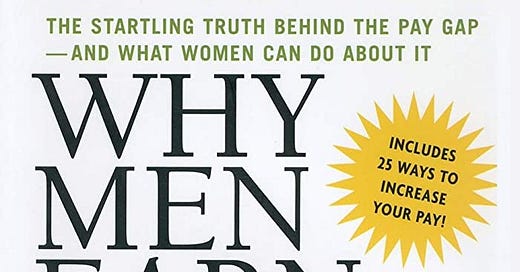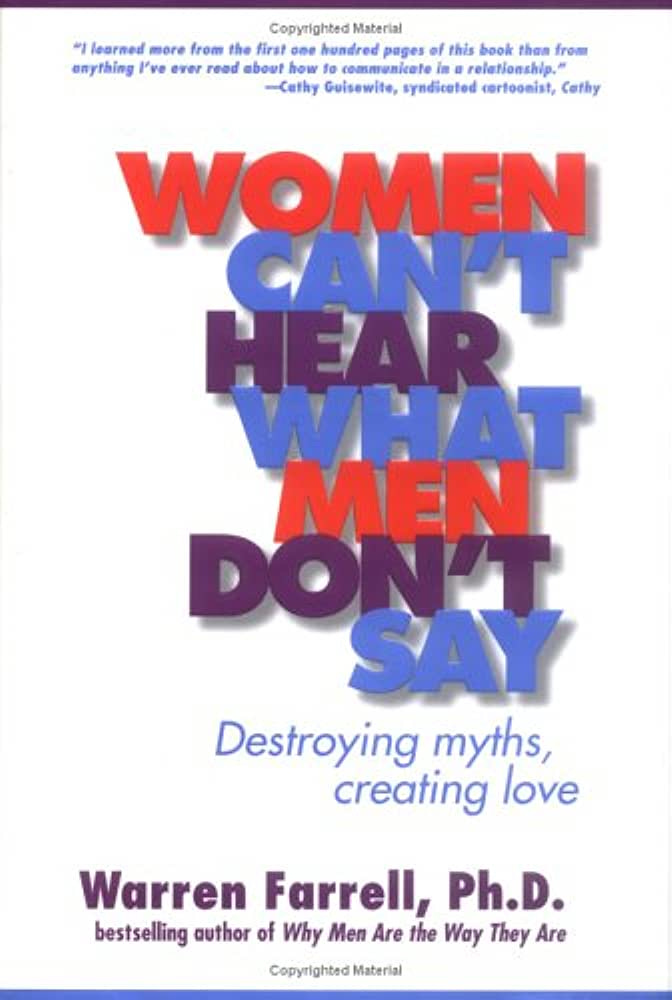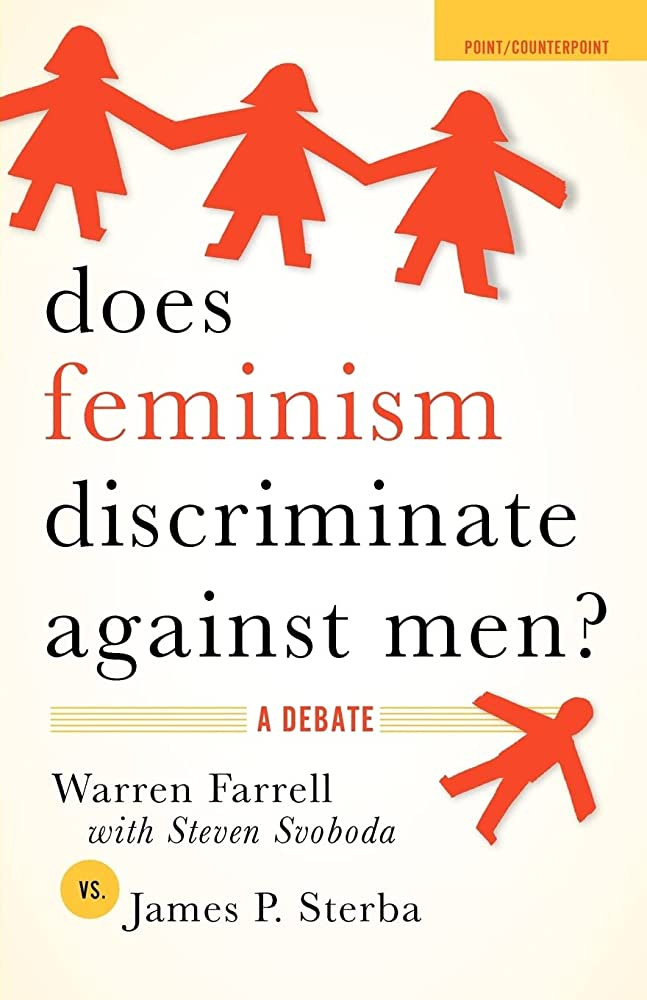
One-Paragraph Book Reviews: Warren Farrell Edition
How to work better, talk better, and think better
I’ve known for years that Warren Farrell’s Why Men Earn More: The Startling Truth Behind the Pay Gap - and What Women Can Do About It existed. But I didn’t actually read it until I was getting ready to write “Don’t Be a Feminist: A Letter to My Daughter.” I liked the book so much that I started wondering, “Who is this ‘Warren Farrell’ - and what else has he done?”
The quick answer is that Farrell was one of world’s first male feminists. He wrote The Liberated Man in 1975, and served on the New York City Board of the National Organization for Women. After a few years of berating men for their insensitivity to women, however, he started to wonder if he, fellow feminists, and women in general were - perhaps, maybe, possibly, occasionally - being insensitive to men. Before long, he realized that insensitivity is a broad two-way street - and started writing books to help both men and women give and get better treatment. Though Farrell continues to identify as a feminist, leading mainstream feminists purged him soon after he started asking his heretical questions. As a result, he is now primarily known as a founder of the Men’s Movement.
By this point, I’ve read almost all of Farrell’s books. Today, continuing my series of One-Paragraph Book Reviews, I’m going to review his three best.
Why Men Earn More: The Startling Truth Behind the Pay Gap - and What Women Can Do About It. At first glance, this book is a popularization of the Beckerian take on the gender pay gap, arguing that the pay gap exists not because of unfairness or “discrimination” but because men and women have different abilities and especially preferences. But much more is going on. Above all, Farrell’s primary goal is not to change discrimination law, but to help women make more money. He enumerates 25 reasons why women make less money in order to alert women to 25 opportunities to make more money. Are you willing to switch to STEM? Work longer hours? Work alone? Commute more? By discussing 25 distinct factors, Farrell’s saying: “Pick a few sacrifices that would bother you the least.” Women can get a lot more money by being a little more flexible about their quality of life. And by implication, men can get much higher quality of life by being a little less focused on money. Most economists will scoff at Farrell’s empirics because he doesn’t do anything like multiple regression. That’s true, but Farrell points out so many blatant differences between typically male and female jobs that academic labor economists barely discuss that he should be scoffing at us. The constructive response, of course, would be for economists to start seriously measuring Farrell’s 25 factors so we can finally do the right multiple regressions.
Women Can’t Hear What Men Don’t Say: Destroying Myths, Creating Love. I can almost hear most of my friends throwing up in their mouths when they read this title, but they are utterly in error. (Especially you, R.H.!) Women Can’t Hear What Men Don’t Say is a revelatory book. Women have long complained that men “won’t talk about their feelings,” but Farrell analyzes why men are so prone to bottle up their emotions. Quick version: Women talk about their feelings because they tend to get sympathy and assistance; men keep their feelings to themselves because they tend to get indifference and scorn. But as usual, Farell doesn’t write to condemn; he writes to help readers live better. He dispenses piles of practical advice on how to both “Give criticism so that is easily heard” and “Hear criticism so that it is easily given.” He also speaks for all the silently suffering men who know from bitter experience that talking about their feelings makes their troubles worse. Added bonus: Women Can’t Hear What Men Don’t Say provides an eye-opening aside on the actual data on partner violence. Contrary to almost everything you’ve heard, the frequency and, yes, the severity of female-on-male domestic abuse is similar to male-on-female violence. We don’t hear about wives and girlfriends injuring their men for the same reason we rarely hear about male suffering of any kind: If complaining just adds insult to injury, you keep your mouth shut. Incredulous? Seriously, you won’t be after you read this book.
Does Feminism Discriminate Against Men? A Debate, co-authored by Farrell and his opponent, philosopher James Sterba. This book rapidly covers a long list of gender issues: discrimination, health, domestic violence, childcare, custody, education, and much more. Sterba’s performance in the debate markedly exceeded my expectations; he’s possibly my favorite feminist. Sterba avoids ad hominem arguments and maintains a dispassionate tone throughout. He also claims that Farrell makes numerous factual errors - and whenever I checked Sterba’s fact-checking, Sterba was correct. For wisdom, however, Farrell towers over Sterba. Farrell constantly makes reasonable points - and reasonable concessions to the other side - while Sterba argues like a lawyer. Isn’t the male-only draft, military slavery that led millions of men (and near-zero women) around the world to die in combat over the last century, an undeniable case of unfairness to men? According to Sterba, absolutely not!
Farrell and Benatar maintain that the male-only draft and the combat exclusion of women is primarily a form of sexism that benefits women. But how could this be, when denying women access to combat roles denies women access to the most prestigious positions in the military and hinders their advancement both within and without the military?
Sterba occasionally reminds Farrell that the issue under debate is not “Does Society Treat Men More Fairly Than Women?” but “Does Feminism Discriminate Against Men?” And he correctly points out that much of the alleged unfairness that males endure relative to women long predated feminism. Feminists obviously didn’t start the all-male draft. Yet strictly speaking, both Farrell and Sterba are off-topic most of the time. The book is simply mistitled; it should have been called Is Feminism True? A Debate or Does Society Treat Men More Fairly Than Women? A Debate.
P.S. The final review counts as one paragraph. The formatting just looked terrible when I tried to insert the blockquote in the text. :-)














> and, yes, the severity of female-on-male domestic abuse
I really don't believe that claim. Male upper body strength is obviously far higher than a woman's, so injury is much more likely, and men engage in the most severe kind of violence (homicide) at many multiples the rate at which women do.
One of the factors that never seem mentioned in the discussion about the male-female wage gap is the litigation risk. Given the choice between equally attractive candidates, an employer has to consider the risk of hiring a woman or a person in any other group covered by discrimination law. A young white male is the only person who cannot sue for discrimination if fired. For this reason, I have argued that discrimination laws hurt the people they are trying to protect.